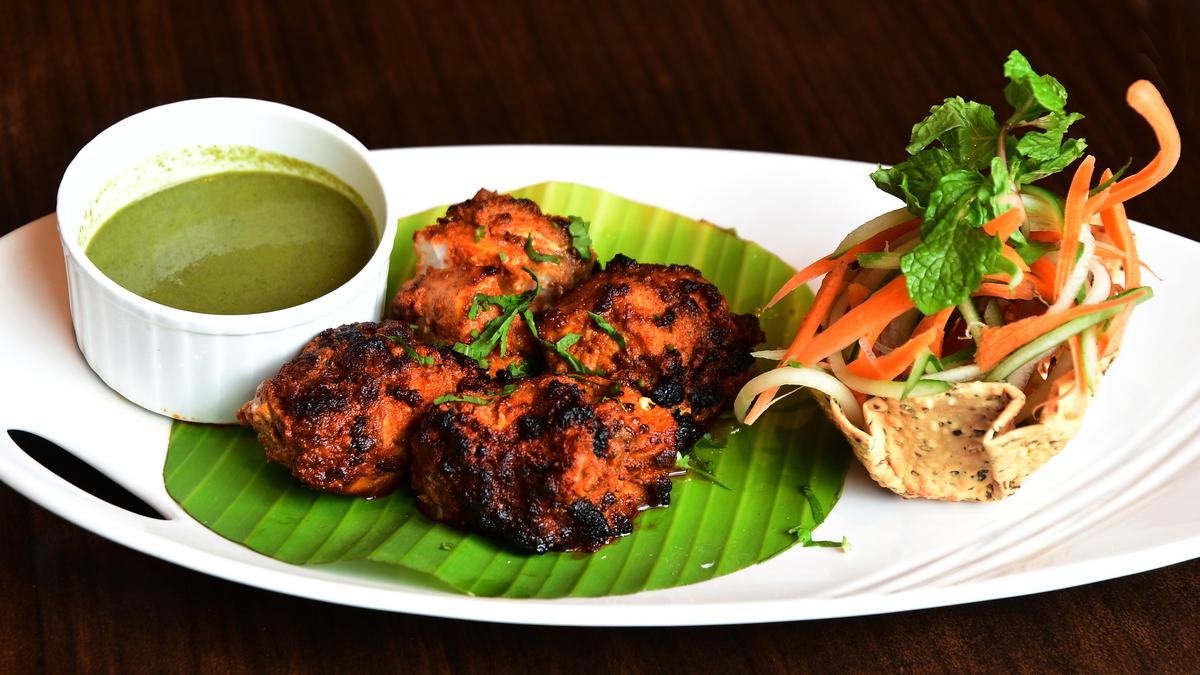
Kebabs, dum biryanis, and ‘khubani ka meetha’ at an ongoing food festival in Coimbatore
The Hindu
An ongoing food festival brings popular Hyderabadi kebabs, biryanis, and khubani ka meetha
Chef Bilal Khan fuels our conversation on Hyderabadi cuisine with the story of meat-loving toothless Nawabs. “The royal cooks had to come up with something that the nawab could eat without having to chew. They ground the meat into a fine paste and then added ginger and garlic, poppy seeds and various combinations of spices, made them as patties and roasted them over a fire. The resulting kebabs were crispy on the outside but so soft and silky within that even the toothless could eat them with pleasure,” he explains, speaking about cuisines from Hyderabad which is a blend of Persian, Mughlai and Lucknowi at an on-going food festival at Latitude Restaurant of Vivanta Coimbatore.
Born in Hyderabad, Bilal who is now with Taj Krishna there, is an expert on royal cuisine and comes with 33 years of experience (earlier at Taj Banjara) with a knowledge of authentic Hyderabadi food and relates to the regal kitchens of the erstwhile Hyderabadi Nawabs. He talks fondly of the flavoruful Hyderabadi kache gosht ke dum biryani. “We first cook the rice and when it is half done we mix it with raw meat simmering in masala and cook them together,” he says sharing a nugget on Nawabi cooking where the proportion of meat is always more than the rice. The result is a flavourful biriyani with tender meat that falls off the bones.
The menu at the festival features a variety of kebabs like ajwaini machhi tikka that has juicy fish cubes in a refreshing marination, and favourites like kebab-e-firdaus (with chicken thighs), mutton sheekh and more. “Most royal dishes are mild on spices but have a rich taste because of the generous use of dry fruits like cashew nuts, almonds, and pista in the form of ground paste. Hung curd is another must. We wanted to offer an exciting royal fare for our diners,” says Saratchandra Banerji, executive chef of Vivanta.
Hyderabadi cuisine draws from the legacies of Deccani cuisine of Nizams with its delectable biryanis, haleem (pounded wheat and mutton dish) and kebabs. Some of the dishes like dum ka murgh made with hung curd and richly endowed with nuts and assorted spices and cooked in ghee or dum ki nalli, a mutton dish in fiery red gravy (that comes from fried onions paste) or a Nizami handi, a mixed vegetable sabzi, can be enjoyed with rotis and butter naan.
And the best part is the indulgent sheer-e-khorma, a hot rich kheer made from super fine vermicelli, and double ka meetha, a juicy bread pudding garnished with finely chopped raisins, almonds and cashew nuts that can be savoured just the way the Nawabs relished it.
The festival is served as a dinner buffet priced at ₹1700 plus taxes till October 1. For reservations, call: 9895053224 or 9039030184

Under the NBS, newborns are screened for communication disorders before they are discharged from the hospital. For this, AIISH has collaborated with several hospitals to conduct screening which is performed to detect hearing impairment and other developmental disabilities that can affect speech and language development. The screening has been helping in early intervention for those identified with the disorders, as any delay in the identification poses risk and affects successful management of children with hearing loss, according to AIISH.












